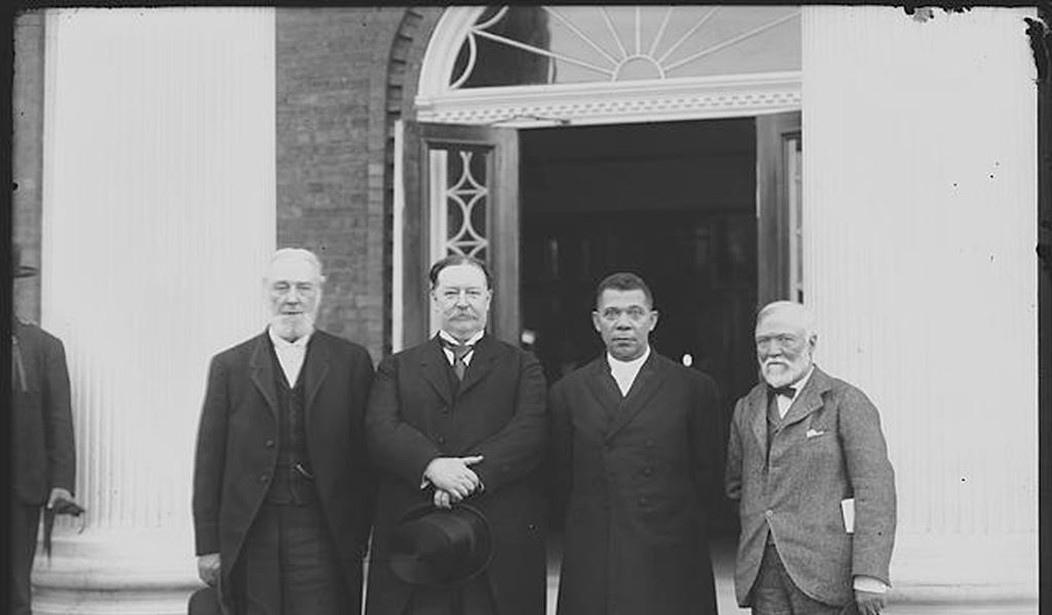Editor's Note: This column was co-authored by Kent M. MacDonald.
As longtime admirers of legendary civil rights pioneer and educational entrepreneur Booker T. Washington, we felt compelled to pay tribute to this profoundly influential American during Black History Month.
Born into slavery on April 18, 1856 in Hale’s Ford, Virginia, Washington died a free man 59 years later on November 14, 1915 in Tuskegee, Alabama. From a young age, he understood the power of education. He worked hard and earned degrees from Hampton Normal, an agricultural institute (today Hampton University) and Wayland Seminary. Washington became recognized as a leading educator, author, orator, champion of freedom, mentor and advisor to thousands, including U.S. presidents William Howard Taft and Theodore “Teddy” Roosevelt. As a prominent leader in the African American community, Washington fought the disenfranchisement of freed slaves during reconstruction as well as discriminatory laws like Jim Crow.
Booker T. Washington also helped found Alabama’s renowned Tuskegee Institute (now Tuskegee University) nearly 140 years ago. The school’s unique mission produced stellar students who appreciated the theoretical and practical sides of higher education.
Booker T. Washington’s words and influence remain powerfully relevant today. Former U.S. Congressman and U.S. Army Lt. Colonel (Ret) Allen West recently shared the following thoughts on Washington with us.
Recommended
"When people ask me ‘who is my role model? the answer is easy: my dad, Corporal Herman West Sr., U.S. Army World War II veteran was that guiding hand who shaped me to be the man that I am today. And my dad's best friend was a gentleman named William 'Stickey' Jackson. He was also a World War II veteran, my godfather, and a Tuskegee Airman. My dad and godfather were originally from Alabama, but they settled in Georgia, never forgetting their Alabama roots."
"Therefore, when anyone asks, who is my ideological mentor, the answer is simple. It is the trailblazer, the man, who founded the institution that is now called Tuskegee University, Booker T. Washington. Why? Simple, because as a Black conservative, Washington is the founding father of Black conservatism. His book Up From Slavery is about the indomitable individual spirit to be a victor, not a victim. It provides a roadmap for economic independence, not dependence. Booker T. Washington, in establishing Tuskegee Institute, had a three-point plan -- education, based on critical thinking, entrepreneurship, and self-reliance. Education was not just about, as the ol' folks down south say 'book learning.' It was about an industrial education that created skills, talents, and capabilities. It is easy to understand why the famed botanist, George Washington Carver, chose Tuskegee Institute to conduct his research, which became the founding basis for research-based institutions of higher learning, especially agricultural-centered studies. The students at Tuskegee, under Washington's leadership and vision, built the institution by their own hands. They grew their own foods, constructed their own furniture, including beds."
"Booker T. Washington believed the true value of an education was not in what you knew, it was what you could produce and contribute to society through voluntary free exchange. That is where one attains self-esteem. My Mom taught me, 'self-esteem only comes from doing estimable things.' Government programs cannot endow you with self-esteem, certainly not self-reliance."
In these divided times, we invite everyone to reflect on the unifying words and great wisdom by Booker T. Washington: “there are two ways of exerting one’s strength, one is pushing down, the other is pulling up.”
Booker T. Washington, through his works and deeds and the sheer power of his inspirational ideas, has pulled millions of people up, including academics like us – for which we are forever grateful. This Black History Month we should all find the time to pay tribute to heroes like Booker T. Washington, Allen West, Herman West Sr., William ‘Stickey’ Jackson, and the 450 heroic Tuskegee Airmen who were deployed overseas during WWII, helping to save much of the world from despots like Benito Mussolini and Adolf Hitler. Many of the flyboys from Tuskegee, Alabama paid the ultimate sacrifice and are buried in cemeteries across Europe. While most returned to the United States, the country they proudly fought for, had to overcome much prejudice. In doing so, they helped to build cities from Washington, D.C. to Detroit, Michigan and states from Florida to California, into the world’s post-WWII economic powerhouse.
Today, as America’s global economic leadership is being questioned, we would be a far better country if all of us took the time to read (or re-read) Booker T. Washington's Up From Slavery. In doing so, we should embrace its powerful message of a former slave who overcame great odds to advance economic empowerment through an enlightened vision that education is the key to individual freedom and achievement.
Dr. Kent M. MacDonald is president of Northwood University and Dr. Timothy G. Nash is director of The McNair Center at Northwood University.

























Join the conversation as a VIP Member